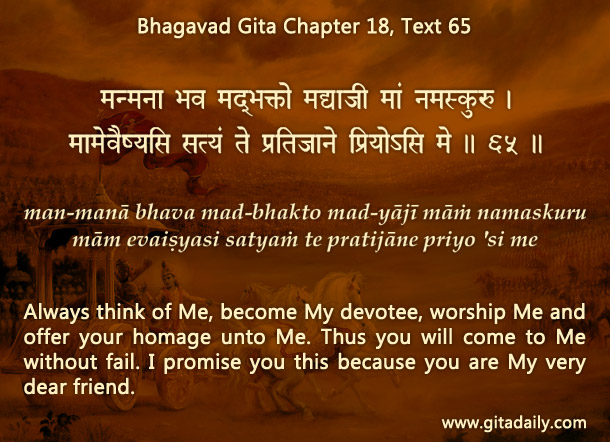Some Gita interpreters claim that Krishna is just a medium for transmitting the wisdom coming from some higher, impersonal divinity. To support this, they point to Krishna’s third-person references to himself in the Gita.
Let’s analyze this claim from three perspectives.
First, the Gita contains many categorical statements, wherein Krishna referring to himself in the first-person is proclaimed as the highest reality. Consider just a few such statements:
- There is no truth superior to me; I pervade all of existence (07.07).
- Everything emanates from me and exists in me — those who know me thus become enlightened and wholeheartedly devoted to me (10.08).
- Those who know me as the Supreme Person (Purushottama) know everything (sarva-vid) — they become wholeheartedly devoted to me (15.19).
- I am the goal, the sustainer, the master, the witness, the abode, the refuge and the most dear friend. I am the creation and the annihilation, the basis of everything, the resting place and the eternal seed. (09.18).
Second, even when the Gita refers to a Divinity in the third-person, nowhere does it declare that Divinity to be the highest reality. To the contrary, such third-person references are frequently and quickly followed by a first-person reference to Divinity, with the context usually indicating that the later references point to a higher spiritual understanding (eg. 15.17 is followed by 15.18, 18.62 by 18.66; 6.29 by 6.30).
Third, whereas the third-person references to Divinity are few and far apart in the Gita, the first-person references are many and clustered together. For example, both 09.34 & 18.65 both contain five first-person references. And such emphatic first-person proclamations of Divinity are usually preceded or followed by unambiguous declarations that what is being spoken is the highest truth (eg. 10.01 & 18.64).
One-sentence summary:
The Gita categorically and repeatedly declares that Krishna is the highest reality; nowhere does it state that anything else is the highest reality.
Think it over:
- Which first-person declaration of Krishna’s divinity do you find the most persuasive?
- What does the Gita contextualization of its third person references to divinity imply?
- What does the frequency and force of Krishna’s first-person references to divinity imply?
***
18.65: Always think of Me, become My devotee, worship Me and offer your homage unto Me. Thus you will come to Me without fail. I promise you this because you are My very dear friend.
To know more about this verse, please click on the image


I am the goal, the sustainer, the master, the witness, the abode, the refuge and the most dear friend. I am the creation and the annihilation, the basis of everything, the resting place and the eternal seed. (09.18).
Hare Krishna 🙏
Hare Krishna Prabhu,
Wonderful explanation.
regarding your suggestion to contemplate on “Which first-person declaration of Krishna’s divinity do you find the most persuasive?” I am always uplifted by the following two first person assurances:
(1) Kaunteya Prathijaanehi Na me bhakta pranashyathi (9:30)
(2)Madchittah sarva durgani madprasadath tharishyasi. (18.58)
Yes, those two verses are inspiring.